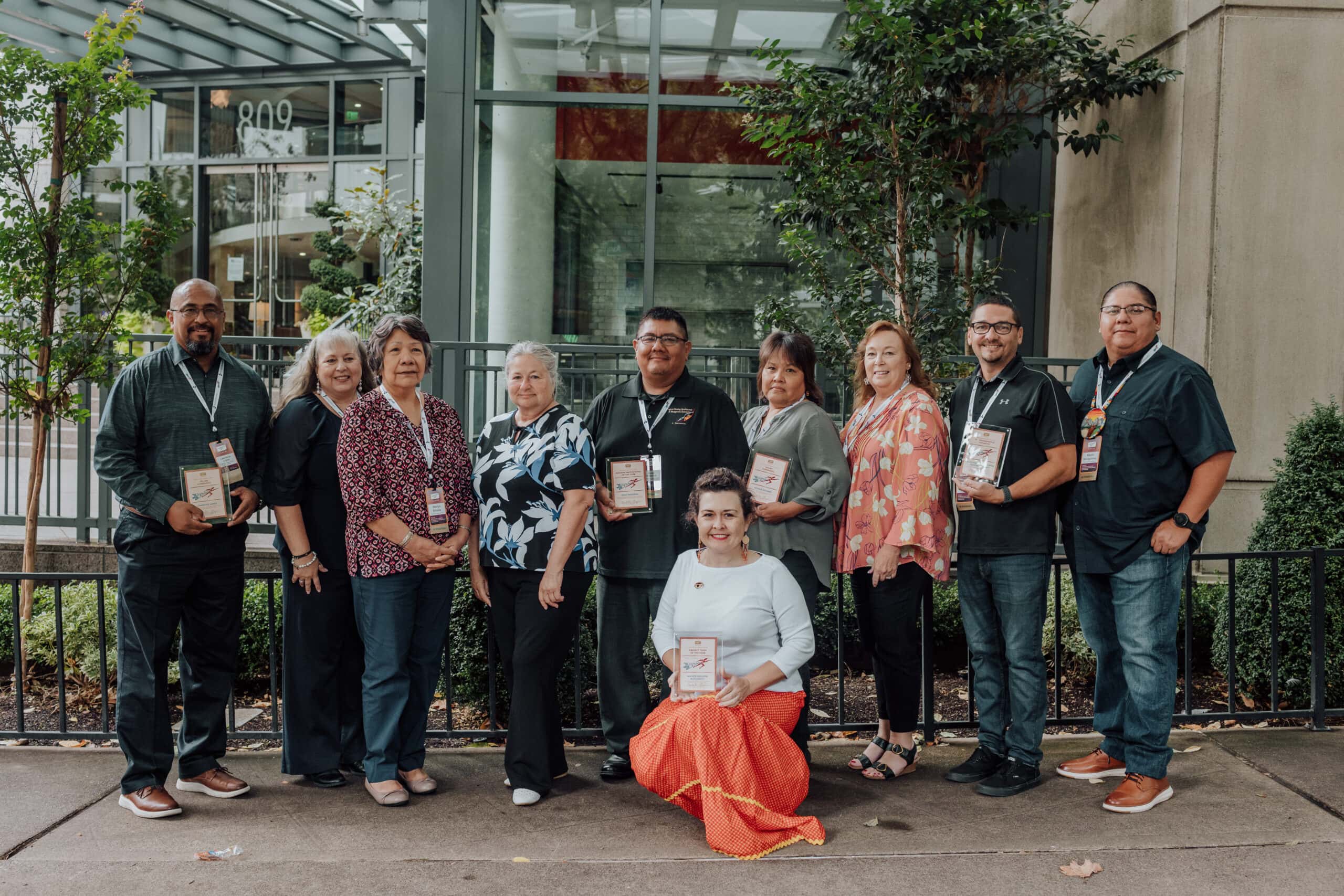Travois recently honored leaders in the housing and economic development industries for their contributions to creating positive change in their communities.
The Travois Superhero Awards, presented at the 24th Annual Travois Conference in Seattle, Washington, recognized professionals who have demonstrated exemplary work in these fields.
The award winners were nominated by their peers and selected by Travois.
Housing Professional of the Year
Jamie Navenma, executive director of the Laguna Housing Development and Management Enterprise (LHDME), was recognized as the Housing Professional of the Year.
Under Navenma’s leadership, LHDME developed 20 townhomes, a community building, and playground areas to serve the Pueblo of Laguna. Laguna III features a mix of two- and three-bedroom homes in a modern, Pueblo-inspired design. The project was targeted and intentionally designed for families with children.
“This project is the first in about 20 years to be completed in the community and provide additional housing for Pueblo of Laguna members,” Navenma said. “Affordable housing and economic development are critical to ensure Tribal sovereignty and sustainable communities that incorporate cultural values and traditions, allowing for Tribal members who live away from ‘home’ to come back and help contribute to the Tribe.”
Economic Development Professional of the Year
Sam Strong, the Red Lake Nation Tribal Council Secretary, accepted the Economic Development Professional of the Year award on behalf of the legal and financial staff.
As a high-achieving economic development team, the Nation has recently financed business, community, and educational projects to advance economic development. The projects include Endazhi-Nitaawiging Charter School, a charter school immersing children in the Ojibwe language and culture, and Red Lake Nation Foods, which involved the acquisition of a wild rice business.
“Their innovative approach to economic and community development is centered on investing in people and focusing on the long-term future of Red Lake Nation citizens,” said Phil Glynn, president of Travois. “It has been a privilege to play a small role in helping them use New Markets Tax Credits to achieve their goals.”
Pillar of the Year
The award of Pillar of the Year, which recognized construction and maintenance professionals, was presented to Lawrence Lopez.
As senior project manager for the Tohono O’odham Ki:Ki Assocation (TOKA), Lopez was instrumental in TOKA V. The a development of 30 new single-family homes is the fifth LIHTC development created by TOKA and includes 14 three-bedroom homes and 16 four-bedroom homes.
“It is a great feeling to see all the hard work being put together and seeing the end result of beautiful homes and communities,” Lopez said. “Another reward is seeing the look on a new homeowner’s face as they start their new journey of homeownership.”
Haven of the Year
Esther Howard, housing services coordinator for the Leech Lake Housing Authority, was named Haven of the Year. The award honors occupancy, resident services, compliance, or asset management professionals who help ensure Native housing remains strong for the future.
Howard was recognized for actively listening to the needs of families and individuals in her community and providing plans of action response.
“We are committed to listening to the people and the communities that we serve,” Howard said. “We are building communities that will have a positive impact and keep our families together for the future.”
Project Team of the Year
The Washoe Housing Authority (WHA) was honored as the Project Team of the Year for displaying creative thinking and problem-solving to build more affordable housing for its community.
WHA developed Washoe II, a LIHTC development with 20 single-family homes and a community building to serve the Washoe Tribe of Nevada and California. By leveraging multiple funding sources, WHA great shown determination in successfully creating this new construction project in the Stewart Community.
“Washoe Housing Authority has not had the means to building homes in over 20 years. We are excited to bring quality homes that will be eventual tenant ownership to deserving Tribal members,” said Keri Capps, client services manager for WHA. “The most rewarding aspect has been seeing the project progress from conceptual to close to completion. We are so excited to be able to provide beautiful, well-built homes to our Tribal members.”
Groundbreaking Team of the Year
The Knik Tribe was awarded Groundbreaking Team of the Year, an honor recognizing a Tribally Designated Housing Entity for successfully beginning its first Low Income Housing Tax Credit (LIHTC) development.
In Wasilla, Alaska, the Knik Tribe developed Knik Homes I, which features eight new fourplexes with a combined 32 two-bedroom units. The units are targeted for residents ages 55 and older, with 24 units set aside for individuals and families experiencing homelessness.
“Housing affordability is a critical challenge across Alaska, and even more so in the Mat-Su Borough, the fastest-growing community in the state,” said Ronna Canady, assistant housing director of the the Knik Tribe. “By creating a healthier community and investing in our children and providing stable, safe, affordable housing for our lowest-income community members, it provides children with a more equitable path forward by keeping them housed to cultivate healthier societies.”
Transformative Initiative of the Year
The Lac du Flambeau Chippewa Housing Authority (CHA) was honored as the Transformative Initiative of the Year for its rehabilitation of 24 single-family homes.
Referred to as LDF CHA I, the project involved major renovations of many homes that were previously uninhabitable. Three-bedroom homes will be transformed into four-bedroom houses to accomodate larger families and reduce overcrowding.
“One of the long-term benefits of this project is that it will help the Tribe be able to sustain Tribal membership here in the community,” said Jeff Ackley, executive director of the CHA. “They will not have to move off the reservation to find other housing.”

